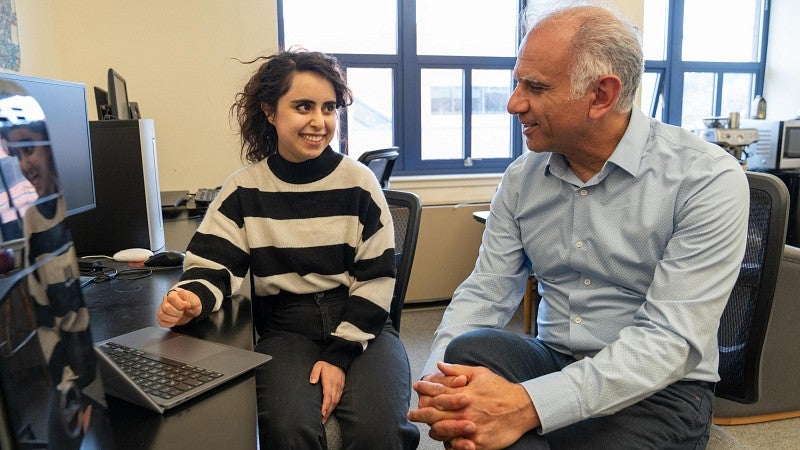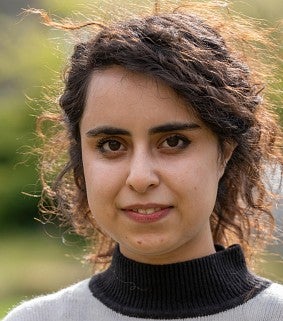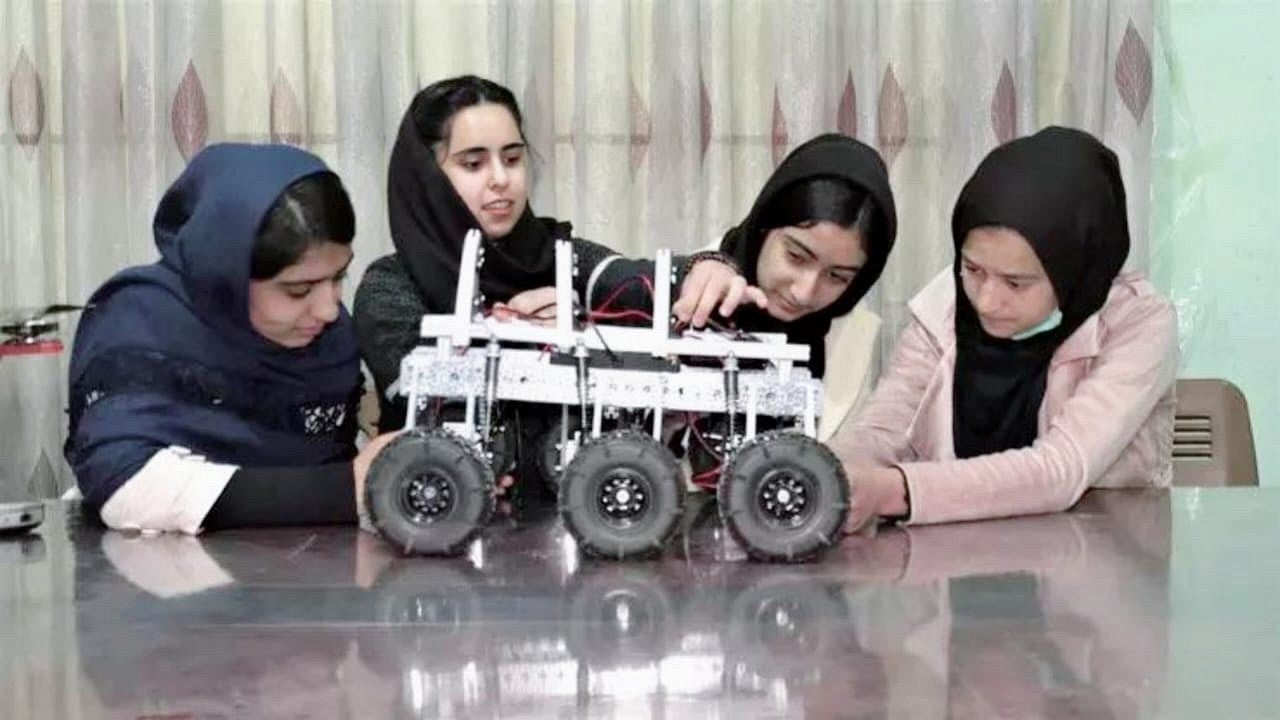
Escaping the Taliban, She Fights for Education and Women
Saghar Salehi fled her homeland when her life was threatened and landed at the UO to advocate for women in Afghanistan
By Nicole Krueger • Photos by Charlie Litchfield • April 3, 2024
6 min read
When Saghar Salehi joined Afghanistan’s first all-girls robotics team as a high schooler in 2017, she did so in the face of warnings from her classmates and neighbors.

The team planned to tour internationally, despite the fact that girls weren’t allowed to travel outside the country without a male guardian and were discouraged from learning about science and technology.
“We were girls, we were doing science, we were building robots. It was all strange for people to think about,” says the nineteen-year-old computer science major at the University of Oregon. “I wanted to fight the idea that engineering and computer science were only for boys.”
That decision changed the course of her life. Before arriving at the UO in January, Salehi was a global newsmaker at the heart of an international story about Afghan women’s fight for freedom—a fight that nearly cost her, and her teammates, their lives.
Known as the Afghan Dreamers, Salehi and the robotics team captured the world’s attention as they traveled the globe from 2017 to 2021 to compete in robotics contests, demonstrating what women from Afghanistan could achieve with education and opportunity.
But just when the Afghan Dreamers began to feel unstoppable, the Taliban seized power in Afghanistan, toppling the country’s democracy and issuing death threats against the team.
In August 2021, Salehi and the rest of the team fled their homeland together, seeking a safe place to continue their education. For Salehi, that sanctuary was a new home as a student in the UO Department of Computer Science.
“We are trying to prove the Taliban wrong,” she says. “Women can go for their dreams and achieve their goals.”
Trouble in DC, then a triumphant return
By age five, Salehi was captivated by technology. She used her brother’s computer up to five hours a day at their home in Herat, the largest city in western Afghanistan.
Says Salehi: “It was a magic box for me.”
Although women weren’t allowed to study science, technology, engineering, and math at university or leave the country without a male chaperone, Salehi dreamed of studying abroad. She developed her English skills by reading computer science textbooks, which weren’t available in the Farsi language. At fourteen, she became one of six girls chosen from around the country to join the all-girls robotics team sponsored by a nonprofit founded by an Afghan American woman to support female entrepreneurs.

When their visas for a July 2017 robotics competition in Washington, DC, were denied, the team refused to admit defeat. Their multiple attempts to enter the country drew supporters and global attention, and ultimately a petition signed by fifty-three members of Congress was followed by approval of their visas.
The girls returned from the competition with an award for courageous achievement in hand. TV news was at the airport to greet them. The Afghan ambassador to the US even came to welcome them home.
“People were having a change in perspective. They were now proud of us,” Salehi says. “Bringing home a medal, waving the Afghan flag—people saw it as a national honor, and we were representing the country. Girls across Afghanistan now wanted to be part of the team.”
Labeled infidels by the Taliban
The Afghan Dreamers traveled to more than forty countries, competing in robotics tournaments, speaking at events such as the United Nations General Assembly, and drawing international media attention.

They began holding robotics workshops for girls in Kabul and Herat, teaching nearly six hundred students each year. In 2019, they met with Afghan president Ashraf Ghani to discuss building a school in Kabul where women could study subjects such as science and math.
Their mission—to change the world’s perception of Afghanistan from that of a war-torn country to a thriving hub for technological advancement—became the subject of a documentary, Afghan Dreamers.
“We are the new generation,” Salehi says. “We use technology for achieving our goals.”
But while the team won acclaim abroad, violence was spreading back home. Less than a month after the robotics competition in DC, the father of one of the team members was killed in an ISIS bombing at a mosque.
When the Taliban began seizing control of the country in 2021, they circulated photos of the Afghan Dreamers, labeling them infidels and saying they should be killed.
“We were physically scared for our lives,” Salehi says. “Everything we had done in our whole lives became very dark. We were worried about the safety of our families.”
Sarah Porter, founder of a global AI community called InspiredMinds, rallied more than three hundred volunteers and raised funds to help the team flee to a safe house in Pakistan in August 2021.
The goodbye she said to her homeland and family three years ago still makes Salehi cry.
“It was the most difficult time in my whole life,” she says. “All I could do was hug my mom. I was crying so hard. We knew we had to leave our country forever.”
Committed to helping Afghan women
Reza Rejaie, professor and head of the College of Arts and Sciences’ computer science department, learned about Salehi in August 2022 through an appeal for help from InspiredMinds on Twitter.
Salehi was living with her family, who also had left Afghanistan and settled in the Bay Area. She desperately wanted to earn a college degree but couldn’t get financial aid because of her refugee status.
“When I heard about her story, it really resonated with me, both as a department head and as a father. It became my mission to bring her here,” says Rejaie. “Despite everything she has gone through, and despite her inability to go back to her country, she’s still committed to making things better for the girls she left behind. Welcoming someone to our campus who has had such diverse, unique, and difficult experiences is an asset that will enrich all of us.”
Rejaie spent a year securing funding support from the UO Office of Financial Aid and the Rotary Club of Portland. With additional support from InspiredMinds, Salehi’s first year at the UO was funded. In January, Salehi began classes in computer science, math, and philosophy.
“Despite everything she has gone through, and despite her inability to go back to her country, she’s still committed to making things better for the girls she left behind.”
—Reza Rejaie
Although the Taliban has banned girls in Afghanistan from getting an education, Salehi plans to earn a PhD in computer science and develop software that will discreetly connect women to educational opportunities at universities. She also still harbors dreams of creating an online STEM school for people who can’t access education in their own countries. Her plans resonate with people such as Juan Flores, a computer science instructor, who told Salehi he is more than willing to assist her.
Backed by a supportive community, Salehi believes she can make a difference for women in her home country who seek an education despite Taliban rule.
After acquiring so much life experience in such a short time, she admits she sometimes feels twice her age. But her work has just begun—and her desire to be a voice for women in Afghanistan drives her forward.
“Every day I wake up, I feel so grateful. I feel so energized. I will never take this for granted,” Salehi says. “I believe education and technology can help me achieve my goals for girls in my country.”
Nicole Krueger, BA ’99 (journalism), is a communications coordinator for the College of Arts and Sciences.
Charlie Litchfield is director of creative media for University Communications.
Cathy Kralik, senior director of communications for the college, contributed to this article.




